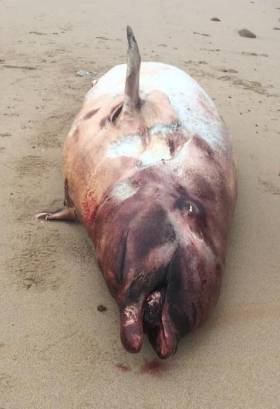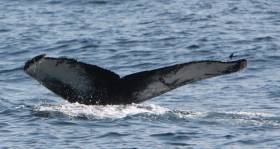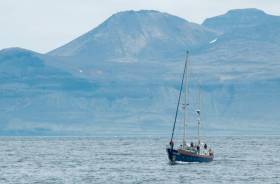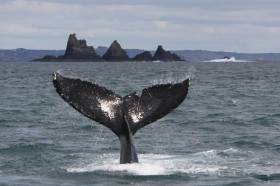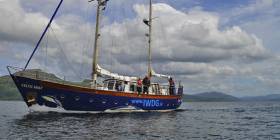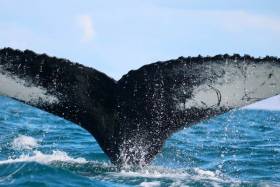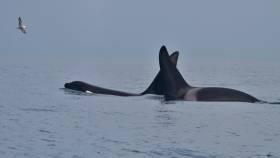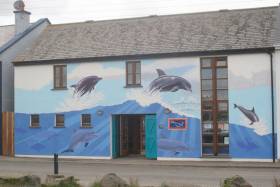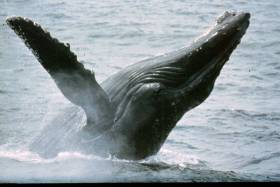Displaying items by tag: IWDG
Whale Deaths off Irish West Coast May Have Been Caused by Sonar
#MarineWildlife - Five dead whales have been found along Ireland's west coast and as BBC News reports, they may have been caused by naval sonar, an expert has said.
Dr Simon Berrow, of the Irish Whale and Dolphin Group (IWDG), said the Cuvier's beaked whales' deaths were "highly unusual".
Three of the whales washed ashore in Co. Donegal on 4 August while another was discovered 12 miles off shore.
A beaked whale was also discovered in Co. Mayo on the same day.
Dr Berrow said usually about three strandings of beaked whales were reported in Ireland every year.
For more on this story, click here.
#OnTV - Be sure to tune in to RTÉ One’s Nationwide tomorrow evening (Monday 30 July) for a special feature on whale watching and the Irish Whale and Dolphin Group’s (IWDG) conservation and research work.
RTÉ filmed with IWDG sightings officer Pádraig Whooley in October 2017 and more recently in mid May of this year, when presenter Anne Cassin and the Nationwide team travelled to West Cork for a day out with Cork Whale Watch.
It proved to be the perfect day for whale watching as the team filmed as many as 30 minke whales, more than 100 common dolphins, and the humpback whale known as HBIRL82.
See the results from 7pm on Monday 30 July on RTÉ One and later on the RTÉ Player.
#CelticMist - The Celtic Mist’s historic marine wildlife survey voyage to Iceland is complete, with the Irish Whale and Dolphin Group (IWDG) recording nearly 100 sightings over the course of the month.
The research yacht set sail with a crew of wildlife enthusiasts and marine scientists in late May for the 2018 IWDG Humpback Whale Expedition, taking less than a week to cross the North Atlantic to the edge of the Arctic Circle.
Week one began on 31 May on arrival at Vestmannaeyjar in the south, following a clockwise route round to Reykjavik — minke whales, humpbacks and dolphins recorded along the way.
Though sightings were slim in number, the Celtic Mist team hailed “great engagement with both Icelandic people and people from overseas working in Iceland”.
“From the Marine and Freshwater Research Institute to tour operators and guides and visiting scientists, all have given us insights into life in Iceland and whaling and whale-watching issues,” said the IWDG’s Simon Berrow.
Week two was spent amid poor conditions in Iceland’s remote West Fjords — with sea ice and stormy weather keeping the Celtic Mist firmly in part at Isafjordur for the first few days.
But later in the week, patience was rewarded with the sighting of five humpback whales, the majority of a group known to the area but never recorded further south-east in Irish waters.
Week three brought a crew change and a break in the weather allowing passage to the north-west peninsula of Hornstrandir — still a challenge with rolling seas overnight.
“In almost 21 hours of sailing in some of the most productive waters on the planet and in reasonable viewing conditions and 24 hours daylight, we didn’t have a single cetacean sighting,” remarked IWDG sightings officer Pádraig Wholley.
“It would be inconceivable that Celtic Mist would survey for a whole day in Irish waters without a single sighting entry being input into the logger software that we were running throughout.
“This was our first strong evidence that if you want to find marine mammals in Icelandic waters, that open waters may not be the place to be looking.”
Week four took the IWDG to the “poorly surveyed” East Fjords, via the Arctic Circle — in bright midnight sun instead of the common sea fogs. Sightings remained consistent, with no big whales spotted on Iceland’s eastern coast.
The Celtic Mist was due back in Ireland by tomorrow (Friday 13 July) when the mammoth task of sorting through all the recorded data and images begins.
But perhaps the greatest takeaway the voyage is in the connections made with Icelanders around their coastline, suggests Berrow.
“We have achieved all our objectives and built strong links with Iceland and its people. We have discussed fishing, whaling, whale watching and the weather.
“We have a great appreciation of these issues and the differing perspectives and challenges faced which ultimately will be decided by Icelanders.”
Have A Whale Of A Time This National Biodiversity Week
#Biodiversity - Whale watches at Cloghna Head and Loop Head cap off a packed lineup of events for National Biodiversity Week, which began this past weekend.
The nine-day initiative aims to connect people with the natural world and communicate the importance of playing our part in protecting Ireland’s biodiversity — from bat boxes to beekeeping and much more.
Among its own series of events for the week, the Irish Whale and Dolphin Group (IWDG) will be hosting whale watches at Cloghna Head in Co Cork on Saturday 26 May, and Loop Head in Co Clare on Sunday 27 May.
Other marine wildlife related events include a celebration of Lough Foyle’s biodiversity lunchtime today (Tuesday 22 May) at Moville Town Library.
Also happening today is an event hosted by the Dublin Civic Trust on the River Liffey as an important wildlife habitat in the heart of the capital.
See the full list of events on the National Biodiversity Week website HERE.
Minke Whales In Huge Numbers Off West Cork
#MarineWildlife - Galley Head was the place to see Ireland’s biggest recorded gathering of minke whales in recent weeks, as TheJournal.ie reports.
Cork Whale Watch skipper Colin Barnes estimated more than 50 minke whales feeding off the coast of West Cork on Sunday 29 April.
“It is remarkable how the month of April extending into May, which was once considered by us whale watchers to be low season for any species, is rapidly becoming one of the busiest times of the year,” said Pádraig Wholley, sightings officer with the Irish Whale and Dolphin Group (IWDG).
West Cork is also one of the best places in Ireland to see humpback whales, who can count marine wildlife specialist Emer Keaveney among their biggest fans.
The “ambassadors of the world’s oceans” are coming to Irish waters in increasing numbers, as Tom MacSweeney stated earlier today.
And they are also the subject of a groundbreaking expedition to Iceland this summer on board the IWDG’s research vessel Celtic Mist.
Elsewhere, the sighting of a dolphin attacking a porpoise off Scotland could point to increased competition over a food source.
As the Irish Examiner reports, dramatic images captured in the Moray Firth earlier this month were part of a series of ‘unusual’ sightings of bottlenose dolphin attacks.
#CelticMist - Join the Irish Whale and Dolphin Group at Dublin’s Grand Canal Dock this Sunday 20 May to celebrate before its research vessel Celtic Mist embarks on a historic marine wildlifearine wildlife expedition to Iceland.
As Coast Monkey reports, visitors on the afternoon from 2pm-5pm will have the opportunity to chat with the crew and marine scientists taking part in the 2018 IWDG Humpback Whale Expedition, as well as take a tour of the Celtic Mist before its final fitting in Donegal.
New Humpback Whale Spotted Off West Cork
#MarineWildlife - Amid a flurry of activity off the Bear Peninsula in West Cork last week was the discovery of a new humpback whale visitor to Irish waters.
Using images captured by marine mammal observation officer Patrick Lyne near Inchydoney on Saturday 31 March, the Irish Whale and Dolphin Group was able to confirm it was a small humpback not previously recorded — and it is now the 86th edition of the species to the IWDG’s catalogue.
“In recent years this resource has seen impressive growth, as humpback sightings have outstripped the larger fin whales,” says IWDG sightings officer Pádraig Wholley. “Of particular interest is 2015, when in a single year the number of individuals more than doubled from 30 to 66 animals.”
The IWDG appeals to anyone who has the opportunity to observe or photograph humpback whales this year to pay special attention to ether the ventral flukes or dorsal fins, which can help identify what whales they are and where they might be coming from.
In other cetacean news, BBC News profiles Northern Ireland's only ‘whale listener’, Co Down woman Sharon Doake
Using specialised sonic equipment, Dr Doake's job entails searching for signs of whale and dolphin activity during surveys for offshore oil and gas prospects.
This is particularly important as such seismic surveys can at best scare cetaceans away from their usual feeding grounds, and even potentially cause physical damage.
“It’s not bad to use this equipment but it’s just that we need to mitigate any effect it can have,” she says. BBC News has more on the story HERE.
#MarineWildlife - Two killer whales spotted feeding off the Blasket Islands earlier this week have been identified as members of a unique pod from Scotland.
“Killer whale sightings in any Irish waters are rare events, and they seem to be getting rarer,” said Pádraig Wholley of the Irish Whale and Dolphin Group, whose member Nick Massett photographed the orcas in Dingle Bay on Monday 5 March.
Massett identified one of the two cetaceans immediately as John Coe, and its partner as another adult male, Aquarius. RTÉ News says the orcas were likely hunting seals in the area.
Both are members of the genetically distinctive Scottish West Coast Community Group, which commonly feeds in the Hebridean Islands but has previously been found as far as Lough Swilly and Scotland’s east coast, likely in search of food.
“Colleagues from the Hebridean Whale & Dolphin Trust can confirm that John Coe was seen exactly seven days [previously] in Scottish waters … which tells us a lot about the movements of this highly mobile apex predator,” said Wholley.
The Scottish West Coast Community Group has been feared to be on the ‘brink of extinction’ for many years. In January 2016 the pod lost a female member, Lulu, due to what was at first thought to be entanglement with fishing gear but was later blamed on PCB pollution.
IWDG Requires Bottlenose Dolphin Research Assistants For The Shannon Estuary
#MarineScience - The Irish Whale and Dolphin Group’s Shannon Dolphin Project is seeking research assistants from May-September 2018 based in Kilrush, Co Clare.
Research assistants will be required to conduct monitoring surveys from dolphin-watching tour boats, spend a considerable amount of time on Shannon Estuary bottlenose dolphin photo identification and related office tasks, and assist in the management of the dolphin centre on a daily basis.
Photo ID training will be provided on the boats and in the office. There will also be the opportunity to help with research conducted on board the IWDG’s research vessels Muc Mhara and Celtic Mist, and to assist the IWDG with cetacean strandings should the opportunity arise.
These positions provide an excellent opportunity to develop skills in marine research and education and to assist with one of the longest-running bottlenose dolphin population monitoring programs in Europe.
There is no monetary compensation for these positions and a contribution of €400 per month towards accommodation and utilities is required.
Volunteers will be expected to work and live as part of a team with shared cooking and cleaning duties. Accommodation will be provided in a shared house within walking distance of the dolphin centre and town of Kilrush. Research assistants are responsible for their own food costs and travel expenses to and from Kilrush.
The closing date for applications is Friday 30 March. However, early application is recommended. Shortlisted candidates will be required to undertake a Skype interview in April. Successful applicants will be notified by mid-April.
Full details on the positions can be found on the IWDG website HERE.
#Lecture - The Friends of Glenua first 2018 lecture entilted ‘Whales & Dolphins in Ireland’ Current Knowledge & New Discoveries is to be presented by Dr. Simon Berrow, next Thursday 11 January.
As usual the lecture programme is held in the Poolbeg Yacht & Boat Club, Ringsend, Dublin 4 with the talk beginning at 20.00. There will be an entry €5 in aid of the RNLI.
Dr Simon Berrow was a founder member of the Irish Whale and Dolphin Group and is currently their Head of Science. He is also a full time lecturer at the Galway-Mayo Institute of Technology, teaching on the Applied Freshwater and Marine Biology degree and runs the long-term Shannon Dolphin Study on Bottlenose dolphins in the Shannon Estuary.
Simon has worked on whales and dolphins since 1989, largely in Ireland, but is also involved in a humpback whale study in Cape Verde and spent 2.5 years on South Georgia with the British Antarctic Survey.
In his talk, Simon will introduce the rich community of whales, dolphins and porpoises in Ireland to the audience. He will share some the findings of new studies on whales and dolphins in Ireland from inshore to offshore waters, from coastal to deep-diving species. Also he will discuss what we need to find out in order to conserve these magnificent creatures.


























